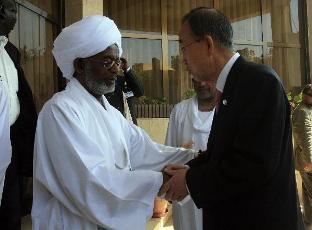NCP decides to back Sudan’s diplomatic position on UNSC resolution amid growing rifts
May 6, 2012 (KHARTOUM) – The ruling National Congress Party (NCP) in Sudan is once again facing pressure from extremist elements as it officially agreed on Sunday to support the government’s reluctant acceptance of a UN Security Council’s (UNSC) resolution ordering the country to return to negotiations with neighboring South Sudan.

Based on a roadmap referred by the African Union (AU), which has been facilitating talks between the two neighbors since they split in July last year, the resolution also ordered Khartoum to cooperate with the rebel Sudan People’s Liberation Movement North (SPLM-N) which has been fighting the Sudanese government in the country’s border regions of South Kordofan and Blue Nile last year.
Sudan signed an agreement with the rebels it accuses South Sudan of backing in June last year but the deal was swiftly scrapped by president Al-Bashir following protests spearheaded by the far-right political group, Just Peace Forum (JPF), led by his uncle Al-Tayyib Mustafa.
Khartoum initially reacted to the UNSC resolution with a mix of resignation and reservations, saying it welcomes its positive elements but insisted that any future talks must, as a matter of priority, resolve the issue of South Sudan’s alleged support to SPLM-N rebels who fought as part of its army before secession.
In a meeting held on Sunday, the NCP discussed the steps taken by the ministry of foreign affairs regarding the UNSC resolution and decided to support them.
NCP’s spokesman Badr Al-Din Ahmad Ibrahim said following the meeting that his party hopes that South Sudan will have the political will to commit to signed agreements and reiterated calls for placing security issues on top of the negotiations agendas.
However, sources close to NCP told Sudan Tribune that there are growing divisions between party members over the UNSC resolution, especially the part that orders Khartoum to negotiate with the SPLM-N.
According to these sources, party hard-liners are advocating total rejection of the resolution and calling for increased preparedness to confront South Sudan and the international community.
But the majority of party members, added the sources, warn of any confrontational scenario, especially with the international community, and called for focusing efforts on resolving internal economic challenges.
Meanwhile, the JPF has started waging a ferocious campaign to prevent any acceptance of the UNSC resolution. In a press release issued on Sunday, JPF’s leader Al-Tayyib Mustafa declared total rejection of the resolution and vowed to resists it by all means.
Mustafa, who is known for his anti-South Sudan sentiments, said that any calls for a political solution between the government and the SPLM-N are out of the question.
“There will be no negotiations with the so-called SPLM-N and we will only sit with them in a court room. [SPLM-N’s secretary-general] Yasir Arman, [vice-chairman] Abdel-Aziz al-Hilu and [chairman] Malik Aggar must be brought to trial,” the hard-line figure added.
The JPF and its jingoistic newspaper Al-Intibaha, one of Sudan’s top-selling publications, have been using their growing political clout to thwart any attempt for negotiated settlements to issues with South Sudan and SPLM-N rebels.
Al-Intibaha’s writers, including Mustafa, show no hesitation to criticize and insult government officials and negotiators when any breakthrough is achieved in talks with South Sudan.
Most recently, the JPF spearheaded a campaign to scuttle a deal Sudan initialed on citizenship with South Sudan, shortly before the latter’s occupation of Heglig disputed region and the outbreak of hostilities between the two countries.
In his press release, Mustafa criticized warnings by foreign minister Ali Karti who said in a radio interview on Friday that those telling Sudan to reject the UNSC resolution are going to bring the country down.
“It is Karti who is going to bring Sudan down with his statements, him and those who negotiated in Addis Ababa and who will return to negotiations” Mustafa said, adding that if the government ever returns to the talks after what happened in Heglig, it will prove that it’s a government that “does not respect itself or its people.”
In a related development, a number of Sudanese diplomats went to great length to defend the country’s acceptance of the UNSC resolution.
Speaking at a symposium organized by the ministry on Sunday, the ministry’s undersecretary Rahmt Allah Mohamed Osman dismissed talks of conspiracy in the UNSC resolution, saying it dealt with both countries in equal measures.
He also expressed rejection to calls by extremist elements to invade South Sudan and change its government, adding that the role of his ministry is to create good relations with the south.
However, he faulted the AU for referring its roadmap to the UNSC without stressing the importance of addressing security issues first.
The ministry’s director of international affairs, Omer Dahab, stressed that Sudan has no plans to destabilize South Sudan, saying that Khartoum wants development and this will not happen under security threats from another country.
But he was keen to allay the concerns of hard-liners, saying that the resolution does not mean that Sudan will have to legitimize or recognize the SPLM-N.
In the same event, Sudan’s ambassador to South Sudan, Mutrif Sidiq, opined that the UNSC resolution is a carbon-copy of the AU roadmap. He added that the resolution is an important step towards ending the war regardless of whether it is acceptable to Khartoum.
Sidiq also said that giving the two countries a deadline to conclude negotiations is in Khartoum’s interest, adding that everyone is fed-up of negotiating without results.
(ST)
